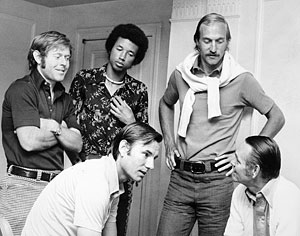The List: boycotts in sport
Simply sign up to the Life & Arts myFT Digest -- delivered directly to your inbox.
This week sees the release of Rush, a film about the 1976 Formula One season, when Austrian Niki Lauda urged fellow drivers to boycott the German Grand Prix on safety grounds. The race went ahead and Lauda’s concerns became reality when he suffered a near-fatal accident on the second lap. John Sunyer considers some other sporting boycotts.
…
1. Papiss Cissé (2013)
The Newcastle United striker refused to wear the club’s shirt earlier this summer because its new sponsor, loan company Wonga, offended his Muslim faith. The waters were muddied when photographs of Cissé in a casino were published. “After a huge amount of thought and reflection, I have made the decision to follow my teammates and wear the kit,” he said of his subsequent U-turn.
2. Johan Cruyff (1978)
Holland’s most famous player refused to participate in the 1978 World Cup in Argentina, and it was widely thought that he, like West Germany’s leftwing left-back Paul Breitner, withdrew to highlight the plight of the thousands who were murdered and tortured by the country’s dictatorship. But 30 years later Cruyff revealed there was another reason: a 1977 kidnap attempt, after which he and his family were placed under police protection for four months. “To play a World Cup you have to be 200 per cent,” said Cruyff. “There are moments when there are other values in life.”
3. Geoffrey Boycott (1974-77)
England’s star opening batsman lived up to his name when, in 1974, he announced he would not play international cricket. His motives were never clear but speculation centred on disgruntlement over the captaincy and the sudden appearance of some very fast West Indian and Australian bowlers.

4. Wimbledon (1973)
Around 80 of the world’s players boycotted the men’s tournament at Wimbledon in protest against the suspension of Yugoslavian Nikola Pilic (shown below, front row, in front of Arthur Ashe) over his failure to fulfil a Davis Cup tie. Thirteen of the 16 seeds dropped out, leaving officials the task of rounding up lower-ranking players to make up the numbers. Jan Kodes, a Czechoslovakian clay courter by trade, went on to become champion.
Comments